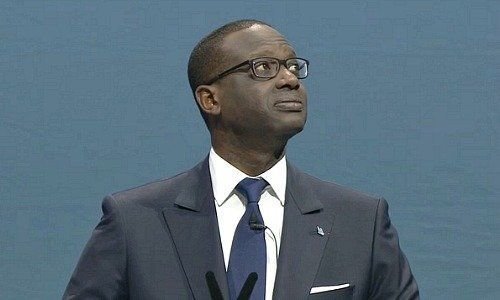Banking Barometer 2019: Credit Suisse
Your definitive guide to the highs and lows of 2019: finews.asia features a year-end wrap for four banks with their highlights of 2019. Here is a look at why Credit Suisse made headlines this year.
Not since Boris Collardi’s headline-making move from CEO of publicly-traded Julius Baer to partner at privately-held Pictet, has one person’s defection from a bank almost completely redefined its brand-value. For Credit Suisse, 2019 was overshadowed by Iqbal Khan, its young and charismatic head of wealth management leaving the bank for nemesis UBS.
That CEO Tidjane Thiam’s blue-eyed boy left the fold was seen as a massive vote of no-confidence in the former mentor’s abilities to either lead the bank to pole position or to foster a culture that would allow anyone else to do so.

Thiam’s (pictured above) personal brand and the fairy-dust that seemed to surround his every move vanished. Tarnished by association, senior management, and the board at Credit Suisse were seen as complicit in their inaction. In contrast, UBS just had to stay out of the fracas to be seen as the only adult in the room.
Criminal Record
The Credit Suisse brand took another blow when three former clients paid for full-page ads in the «Financial Times» in the run-up to the bank’s investor day in mid-December. Demanding to be recompensed for losses amounting to $850 million, the six clients involved claimed in the ads that the bank’s senior management was obfuscating the fraud committed by former banker Patrice Lescaurdon. The ads went on to urge the board of directors to «start being honest and transparent about what happened».
And because good news always comes in threes, a former managing director brought an $89.5 million lawsuit against Credit Suisse in London claiming he could not even get a job as an Uber driver after being dismissed by the bank. Vadim Benyatov was arrested at gunpoint in Romania whilst working on a mandate for Credit Suisse on privatizing state utility companies. He spent time jailed with two heroin dealers and a serial burglar and his criminal record excludes him from any job opportunities that require a background check.
Looks Bad, Could Get Worse
To cap off a largely underwhelming year, Credit Suisse closed 2019 by slashing its profitability target for the year and admitting that tough markets had made adjustments to its profitability target for the next year necessary. To put the announcement into context, fellow European lender Deutsche Bank acknowledged just a few days earlier that its mid-term profitability goals may have been too «ambitious».

Credit Suisse warned that the investment banking and capital markets business would post a loss and the flagship wealth management franchise was stable but buffeted by headwinds from the trade war. The pressure to deliver was significant because the investor update in London was the first since the completion of a three-year restructuring plan. As a result, investors were disappointed by the muted outlook especially by the downward revision in the target return on equity to 10 percent from the previously forecast 12 percent.
Happy Shareholders
Public relations disasters notwithstanding, it is a good time to be a Credit Suisse shareholder. The stock is a clear outperformer in terms of share price returns, leading peers on the Stoxx European banks index by 15 percent.
The bank has promised to redistribute at least 50 percent of its revenues next year to shareholders through dividend payouts as well as a $1.5 billion share buy back. The large tract of long-term, institutional shareholders with Credit Suisse stock should be particularly pleased with the bank, given that dividend payouts are expected to top 5 percent.
The Jewel In The Crown

For Thiam who has spent the better part of the last three years evangelizing about Credit Suisse’s wealth management prowess, redemption is here.
In 2019, Credit Suisse clocked an increased share of group revenues from wealth management and steadily increased market share in every region that the bank has a wealth management footprint. Across markets, net new assets have grown by 5 percent annualized since 2015 and perhaps more importantly, 75 percent of those assets are attributable to the coveted Ultra-High-Net Worth (UHNW) segment. At the end of the third quarter this year, Credit Suisse had $1.5 trillion in client assets under management, no mean feat in a negative interest rate environment.
More Than 600 Relationship Managers
If wealth management is the jewel in Credit Suisse’s crown, it’s Asian business has outshone every other business this year. At 7 percent, net new assets (NNA) grew at a faster clip in Asia than they did anywhere else for the bank, including in its home market. With $222 billion in assets under management in the region, Credit Suisse is still almost half the size of market-leader UBS which has over $400 billion in assets in Asia.

However, Credit Suisse’s asset growth is attributable in large part to increased efficiency rather than bloated headcount. At the end of the third quarter of 2018, Credit Suisse had 550 relationship managers in Asia, it now has 610.
Critically, the 10 percent increase in head-count has been outstripped by asset growth – a key metric of efficiency and ultimately sustainability, for any private bank. In 2018 Credit Suisse had an average of $257 million in assets per relationship manager in Asia. A year later, the bank claims it has an average of $375 million per relationship manager on average – an increase in efficiency of 44 percent.




























